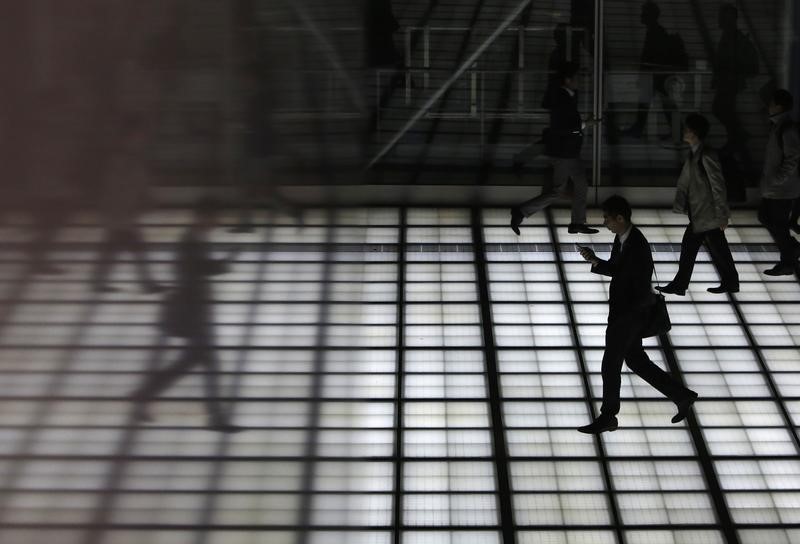By Leika Kihara and Tetsushi Kajimoto
TOKYO (Reuters) - Japan's economy expanded at its fastest pace in a year in January-March as business investment rose slightly, but goods piling up in factory warehouses posed a potential challenge to policy makers seeking to vanquish years of deflation.
Private consumption, housing investment and exports all rose but at a feeble pace, leaving Tokyo with more work to do two years after a radical monetary stimulus programme has brought only scant success.
"The growth number may look good on surface but there's not much to cheer about," said Yoshiki Shinke, chief economist at Dai-ichi Life Research Institute.
The world's third-largest economy expanded at an annualised rate of 2.4 percent in the first three months of this year, beating a median market forecast for a 1.5 percent increase and a revised 1.1 percent expansion in October-December, data from the Cabinet Office showed on Wednesday.
The second straight quarter of expansion in gross domestic product (GDP) exceeded an annualised 0.2 percent gain in the United States and 1.6 percent growth in the euro zone, a sign Japan is steadily emerging from last year's recession.
But inventory was the biggest contributor to growth, adding 0.5 percentage point versus only 0.4 point gained by increases in domestic demand components like capital expenditure, consumption and housing investment.
"When excluding the contribution from inventory, the economy grew a meagre 0.7 percent on an annualised basis," said Takeshi Minami, chief economist at Norinchukin Research Institute, cautioning against reading too much into the positive GDP figure.
Indeed, Dai-Ichi Life's Shinke said there's a risk inventory could shave off growth in the second quarter and keep any economic expansion modest.
DEFLATIONARY MINDSET
The data will be closely scrutinised at the BOJ's two-day rate review that ends on Friday. The central bank is widely expected to maintain its massive stimulus programme and rosy assessment of the economy.
"The economy isn't falling off a cliff. It's recovering, so I don't see this data as piling pressure on the Bank of Japan to ease soon. It's just that the recovery isn't gathering pace," said Shinke of Dai-Ichi Life.
Private consumption, which accounts for roughly 60 percent of GDP, rose 0.4 percent. Capital spending also grew 0.4 percent, below an expected 0.8 percent gain but marking the first rise in four quarters.
The pick-up in business investment is seen as crucial to sparking sustained economic growth and inflation, so the latest numbers should come as some relief to policy-makers.
But the mixed signs from the data underscore a long-time dilemma for policymakers struggling to reflate the economy out of nearly two decades of deflation.
A deflationary mindset from years of falling prices has meant that companies and households remain reluctant to boost spending, even as the weak yen bolstered revenues and led to increase in job and wages.
Economics Minister Akira Amari said a clear end to deflation won't come unless companies start to take more risks and invest.
"It's important that corporate executives wipe off their deflationary mindset," he told reporters after the data, complaining that some weakness remained in capital expenditure.

"In terms of sentiment, Japan hasn't emerged from deflation yet."